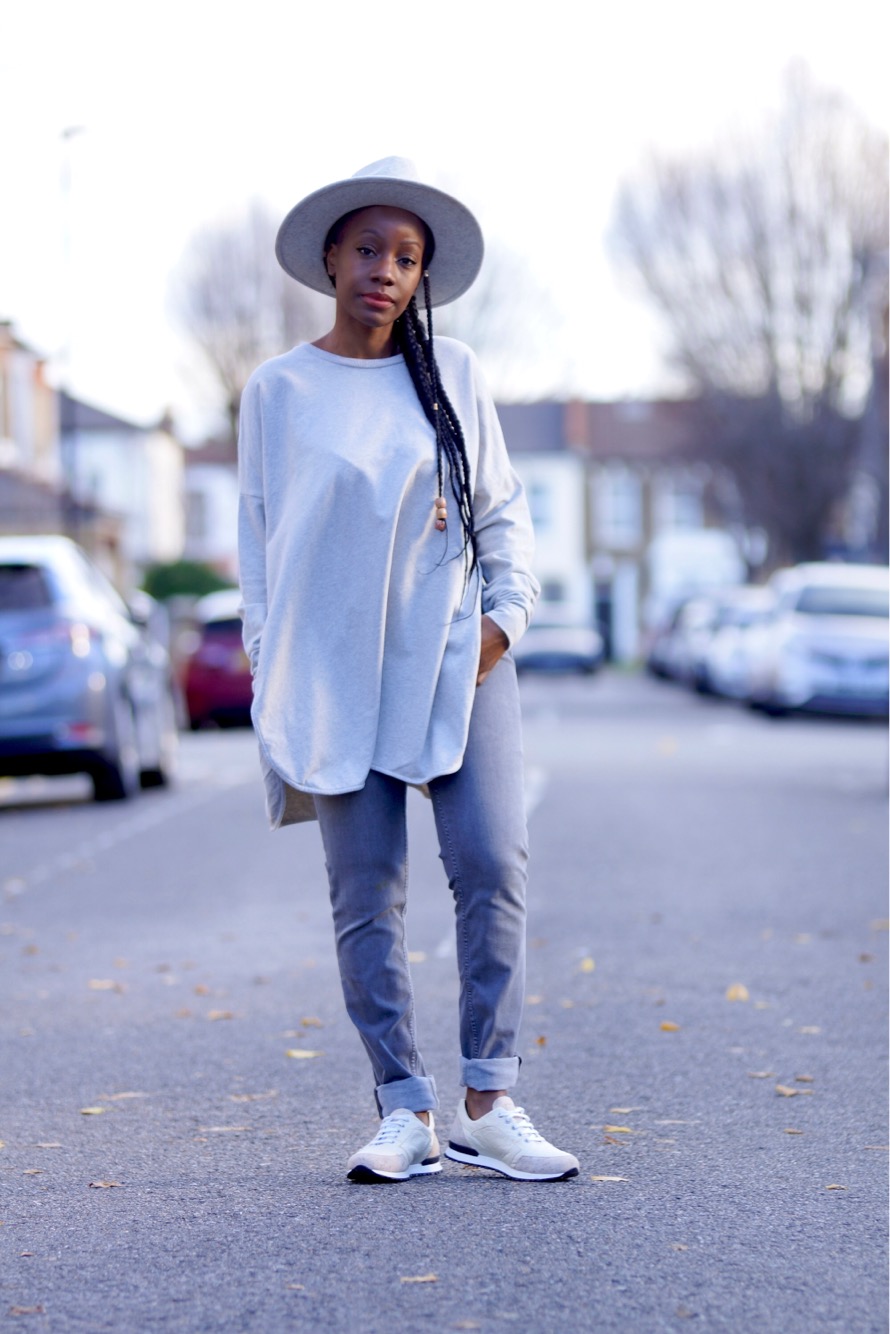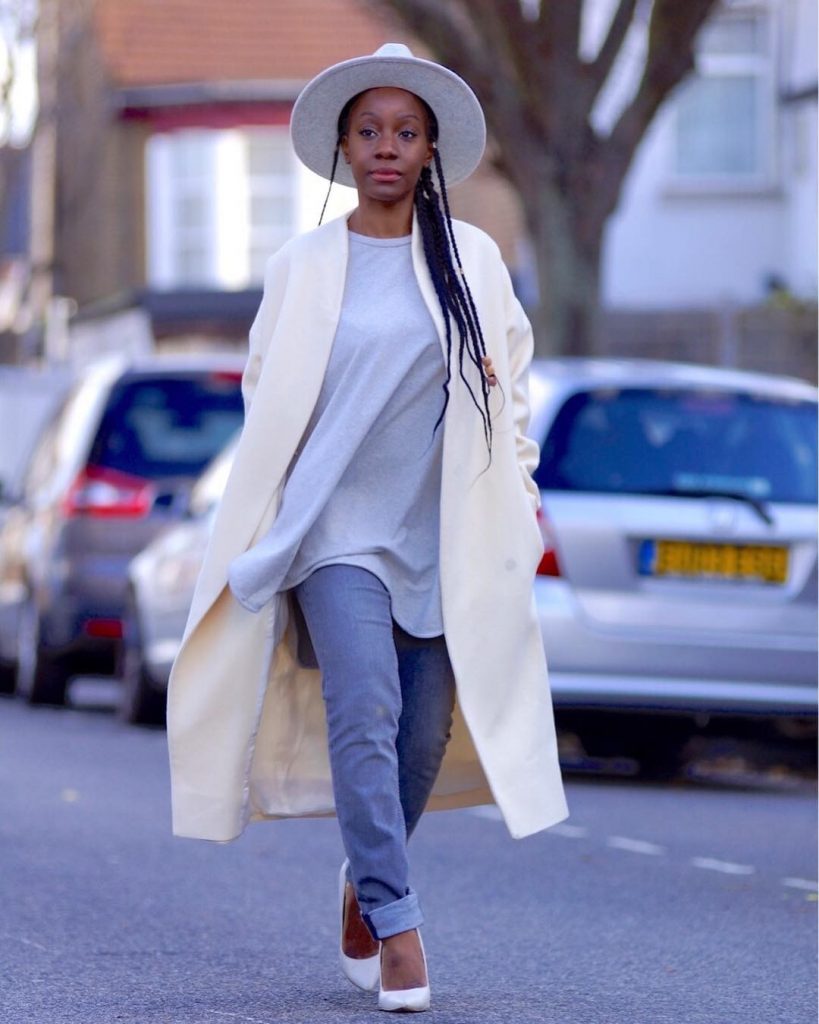Open your wardrobe and have a riffle around. It’s more thank likely that you will stumble upon a pair of jeans in less than 10 seconds. With its durability and ease of wear, denim tends to be a staple in the wardrobe of most, and understandably so. If you are on the look-out for comfort wear or evening garments, denim – in all of its guises – is often the go-to.
Day to evening with Monkee Genes denim and Jumper from Beaumont Organic. Photo credit: Abdiwali Samatar
The impact of denim manufacturing on the environment is however, more than a little abysmal. Derived from cotton, denim is a labour-intensive and eco-abusive. At the start of their live, those jeans which finds themselves on the shelves retailing for as little as £4 (!) in a fast-fashion retailer may have passed through the hands of a Bangladesh garment workers earning as little as 23p an hour! As VICE explained, jeans are one of the few items we tend to keep for a long time, but their environmental toll is significant. We use huge amounts of water and chemicals to make them, though steps are now being taken to mitigate the impact. But with 2 billion jeans produced annually worldwide, it’s going to take a large-scale sustained effort to make a meaningful change.
Monkee Jeans offers a break from this depressing norm, and as the brand proudly proclaims ’No Slave Labour, No Child Labour, No Blood, No Sweat, No Tears’, it is indeed time to delve into what this means for consumers. The brand was founded by designer Phil Wildbore in 2006, borne out of the frustration with the denim mass -market. Wildbore was determined to create denim with was accessible, vibrant and youthful, whilst also able to raise public consciousness with its snappy branding and transparent communications. So what makes these jeans so different? Well, materials for one. Monkee Genes have gone to great lengths to secure the best when it comes to ethical denim – this includes certified GOTS cotton and sustainable bamboo, the latter an eco-lovers’ darling material. By definition a self-generating grass, bamboo is known for its rapid growth properties. It currently holds the world record for the fastest growing plant with a certain species of the 45 genera of bamboo growing at up to 91 cm (35 in) per day or at a rate of 0.00003 km/h (0.00002 mph) – and all of this without the need for fertiliser.
No chemicals are used in Monkee Genes – and this matters. The clothes we wear, particularly tight-fitting denim, sits so closely to our skin. From organic jeans made in Indonesia, to ethically produced jeans from Turkey and grassroots jeans made in England, this brand has a great deal to offer. I had a chat with Phil Wildbore, the ingenious founder and designer behind the phenom.
HOW DO YOU ENSURE YOUR DENIM IMPACTS THE ENVIRONMENT AS POSITIVELY AS POSSIBLE?
At Monkee Genes we are always looking at ways we can be more sustainable and actively looking for more ways we can better our production for the environment and the planet.
Importantly, the ingredients are organic. Using organic cotton removes the use of toxic chemicals, pesticide and insecticides used in conventional cotton farming and production. It’s important to us that our manufacturing partners are all GOTS Certified, using GOTS approved organic cotton in all of our production.
We have also just launched our new Eco Wash collection online, which uses up to 80% less water than typical jean production, and we are currently developing an organic cotton/recycled polyester fabric which we believe will double the jeans’ lifespan (hoping to launch his collection next year).
HOW DO YOU REDUCE OR ELIMINATE NEGATIVE IMPACT?
Make sure you work closely with the manufacturing partner, especially during development. Our partners are always looking for innovative ways to better their production which is a strength of working with like-minded people. They are just as keen as we are to be more sustainable.
HOW DO YOU ENSURE AN EMPHASIS ON COMFORT, QUALITY AND LONG-LASTING FASHION?
The quality of the fabric is the most crucial decision. We have fabrics specially woven for Monkee to achieve this goal. We also listen to our customers, they have been shopping our styles for year. They know what fits they like and what works.
HOW DO YOU COMMUNICATE SUSTAINABLE ATTRIBUTES OF YOUR BRAND WITHOUT SOUNDING PREACHY?
It’s a difficult call, there is a fine line between awareness and preaching. Our mantra is definitely the best way we’ve found. It says what we are, what we believe and goes some way to explain what GOTS is. No Slave Labour, No Child Labour, No Blood No Sweat No Tears.
It’s on all our products, on our swing tags and rear pocket labels, as message to our customers that everything we make is made with care by people who are cared for.
YOU ARE SOLD IN TOPSHOP – HOW IMPORTANT IS IT FOR BRANDS LIKE MONKEE GENES TO BE VISIBLE ON THE HIGH-STREET EVEN IN THE PRESENCE OF FAST-FASHION RETAILERS?
Upping the profile of Monkee Genes is essential, as it is with many other brands. Appearing on the high street gives a brand a new platform and access to new customers who may not have come across us before.
Find out more about the brand by visiting Monkee Genes here.


